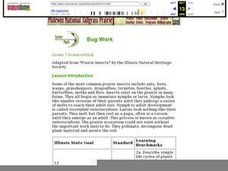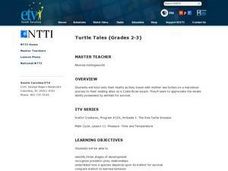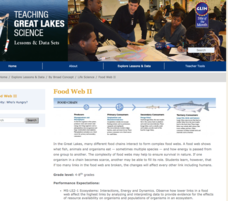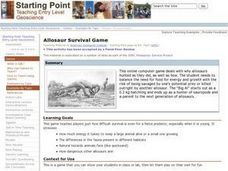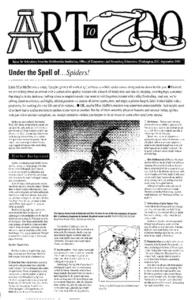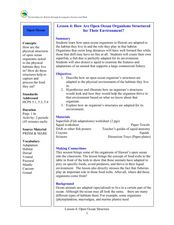Curated OER
Predator-Prey Simulation
Students simulate a predator-prey interaction in an ecosystem. Students use different size squares cut from paper to represent predators and prey. They simulate the interactions of the species by following instructions for the capture of...
Curated OER
Life Cycle of Hawaii's Honu
Students simulate the life cycle of Hawaii's Honu. In this Science lesson, students act out the life cycle of the Hawaiian sea turtle. Students determine and play the roles of prey and predator.
National Science Teacher Association
Middle School Sampler: Science
Focus on inquiry-based learning in your science class with a series of activities designed for middle schoolers. A helpful packet samples four different texts, which include activities about predator-prey relationships, Earth's axis...
Curated OER
redator and Prey- Food chain relationships
Students s identify the different trophic levels in the food chain and understand the importance of the energy cycle. They create a class food web using index cards and yarn and play a predator/prey game.
Curated OER
Bug Work
Students explore the life cycles of insects and how they interact with each other in the prairie to create a healthy ecosystem and viable food chain. They list animals or insects in their own community that are similar to the prairie...
Curated OER
Predator and Prey Game
Students explore the why the balance among producers, predators and prey is necessary in order for an ecosystem to be sustained over time. Through web games and activities, they discover how each component of the food chain works to...
Curated OER
Predator Prey Population Links
Fifth graders relate population of animals to its available food supply. They participate in an experiment and gather information. They use the data to draw conclusions.
Curated OER
Spider Safari
Today we are talking about one of the stealthiest, sneakiest, and most intriguing insects of all times, the spider. Learners will examine the predatory nature of these super bugs as they conduct a spider safari survey. Each child will...
Curated OER
Habitats
Young scholars complete food chains for organisms in three environments. They use copies of the Habitat worksheet. Students review the food chain terms with the teacher. They research related food chains, and interlink these to form a...
Curated OER
Turtle Tales
Students watch videos and fill out worksheets about the turtles and their journey to the Costa Rican beach. In this turtles lesson plan, students learn and discuss survival, predator and prey, and stages of development.
Curated OER
the Journey of the Pacific Salmon in the Open Ocean and Fishing
Third graders discuss salmon and their life cycle. In this salmon life cycle activity, 3rd graders recognize the difficulties researching the life cycle of salmon as they migrate. Students conduct an experiment and create a...
Curated OER
Web of Life
Students construct a web of life. In this ecosystem lesson students are introduced to ecosystems and life cycles. Insects are the main focus.
Michigan Sea Grant
Food Web II
A food web consists of complex food chains and the more complex the web, the better likelihood of survival. Learners compare and contrast food webs and food chains and discuss concepts like the predator-prey and consumer-producer...
Curated OER
Larva and Adult Antlion Body Parts
Students identify the major body segments of antlions. Through the use of diagram worksheets, students label the various body parts of the antlion. They review the life cycle of antlions from the larva stage to adult. Several activities...
Alabama Learning Exchange
I Will Survive
Young scholars explore animal adaptations. In this animal science instructional activity, young scholars watch the video "Kratt's Kreatures" and work in groups to complete a worksheet about animal adaptations.
University of California
Energy and Biomass Pyramids
Young scientists play tag as they act out the food pyramid in the ocean ecosystem. Energy circles pass from the smaller prey to the predators and at the end of the activity, a data chart and analysis questions allow pupils to apply their...
Curated OER
Amazon Food Chain
Explore food chains in the Amazon Rainforest using this resource. Learners discuss the predator vs. prey relationships in the food chain. Then, they create a food web to describe this relationship. This is a simple and effective way to...
Curated OER
Costa Rican Food Chain
Discuss the animals and plants in the rainforest food chain using this lesson. Learners talk about and do research on the top predators from the Costa Rican region and create a model of one of them in class. They also make a visual model...
Curated OER
Critters in Your Own Backyard
Students identify various animals and their habitats, as well as their specific traits In this animal habitat lesson, students list animals they've seen in their backyard. Students select one animal and do research. Students then answer...
Curated OER
Allosaur Survival Game
Students uses this game to see how difficult survival is even for a fierce predator, especially when it is young. It stresses: How much energy it takes to keep a large animal alive or a small one growing, The differences in the fauna...
Curated OER
Under the Spell of Spiders!
Learners read about spider body parts, abilities, tendencies, and life cycles. In this Under the Spell of Spiders! lesson, students create mystery creatures that turn out to be spiders. Learners catch and observe spiders and insects....
Curated OER
How Are Open Ocean Organisms Structured for Their Environment?
Students explore biology by conducting an animal dissection. In this oceanography lesson, students identify the life cycle of a squid and other animals that are involved with commercial fishing. Students dissect a squid in class and...
Curated OER
Adaptable Mandibles
Students define adaptation and highlight example of adaptation in birds and other animals. They study feeding techniques of seabirds and investigate the effect that trash has on wildlife.
Curated OER
Biodiversity in Illinois-Pond Habitats
Second graders construct a pond habitat in the classroom using a small swimming pool partially filled with water, real cattails, a tree log adjoining, and plastic animal life appropriate to a pond setting. They examine the frog in detail...






